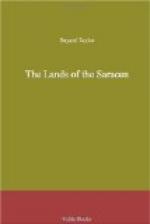Accompanied by Signor di Picciotto, we spent two or three days in visiting the houses of the principal Jewish and Christian families in Aleppo. We found, it is true, no such splendor as in Damascus, but more solid and durable architecture, and a more chastened elegance of taste. The buildings are all of hewn stone, the court-yards paved with marble, and the walls rich with gilding and carved wood. Some of the larger dwellings have small but beautiful gardens attached to them. We were everywhere received with the greatest hospitality, and the visits were considered as a favor rather than an intrusion. Indeed, I was frequently obliged to run the risk of giving offence, by declining the refreshments which were offered us. Each round of visits was a feat of strength, and we were obliged to desist from sheer inability to support more coffee, rose-water, pipes, and aromatic sweetmeats. The character of society in Aleppo is singular; its very life and essence is etiquette. The laws which govern it are more inviolable than those of the Medes and Persians. The question of precedence among the different families is adjusted by the most delicate scale, and rigorously adhered to in the most trifling matters. Even we, humble voyagers as we are, have been obliged to regulate our conduct according to it. After our having visited certain families, certain others would have been deeply mortified had we neglected to call upon them. Formerly, when a traveller arrived here, he was expected to call upon the different Consuls, in the order of their established precedence: the Austrian first, English second, French third, &c. After this, he was obliged to stay at home several days, to give the Consuls an opportunity of returning the visits, which they made in the same order. There was a diplomatic importance about all his movements, and the least violation of etiquette, through ignorance or neglect, was the town talk for days.




